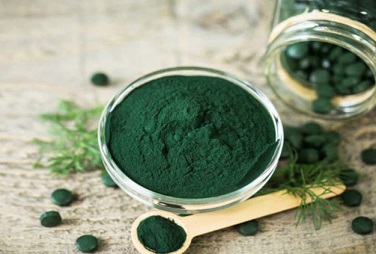Randomized Controlled Trial Showed That High-Dose Spirulina Helps In Clinical Recovery And Reduces Risk Of Mortality In Hospitalized COVID-19 Patients
Nikhil Prasad Fact checked by:Thailand Medical News Team Apr 08, 2024 1 year, 1 week, 14 hours, 54 minutes ago
COVID-19-News: The COVID-19 pandemic, caused by the novel coronavirus SARS-CoV-2, has led to a global health crisis, with millions of individuals requiring hospitalization due to severe symptoms. While various treatments and therapies have been explored, the search for effective interventions continues. One intriguing avenue of research involves the use of high-dose Spirulina supplementation, a cyanobacterium known for its anti-inflammatory, antiviral, and antioxidant properties. This
COVID-19 News report delves into a randomized controlled trial that investigated the impact of high-dose Spirulina supplementation on hospitalized COVID-19 patients, shedding light on its potential benefits in clinical recovery and mortality reduction.
 Randomized Controlled Trial Showed That High-Dose Spirulina Helps
Randomized Controlled Trial Showed That High-Dose Spirulina Helps
In Clinical Recovery And Reduces Risk Of Mortality In Hospitalized COVID-19 Patients
Thailand
Medical News had previously covered a study that showed bio- constituents of microalgae such as spirulina could help inhibit SARS-CoV-2.
https://www.thailandmedical.news/news/study-shows-that-various-bioactive-compounds-from-microlalgae-including-lectins,-polysaccharides,-flavonoids,-polyphenols,-peptides-and-pigments-could
Background and Rationale
The study was conducted by researchers from esteemed institutions such as the Pasteur Institute of Iran, Tehran University of Medical Sciences, Iran University of Medical Sciences, Tufts University School of Medicine-USA, and the University of Sydney-Australia. Spirulina, scientifically known as Arthrospira platensis, has long been recognized for its nutritional value and health-promoting properties. Rich in proteins, vitamins, minerals, and bioactive compounds like phycocyanobilin (PCB), Spirulina exhibits promising therapeutic potential against various health conditions.
Understanding the Immune Response in COVID-19
COVID-19 triggers an immune response characterized by the release of cytokines, often resulting in a cytokine storm that exacerbates inflammation and contributes to organ dysfunction. Studies have highlighted the role of inflammatory mediators such as IL-6, TNF-α, IL-10, and IP-10 in driving disease progression. Severe cases of COVID-19 are marked by uncontrolled inflammation, leading to acute respiratory distress syndrome (ARDS) and increased mortality rates.
Mechanisms of Spirulina Action
Spirulina's mechanisms of action are multifaceted. It inhibits histamine release, modulates immune responses, and possesses antiviral properties, including inhibition of viral replication. Notably, Spirulina has been shown to inhibit the NF-κB pathway, a key r
egulator of inflammation, and activate Nrf2, which plays a role in cellular defense against oxidative stress. These properties make Spirulina a compelling candidate for COVID-19 adjunct therapy.
Study Design and Patient Characteristics
The randomized controlled trial involved 189 hospitalized COVID-19 patients, with half receiving high-dose Spirulina supplementation alongside standard treatment and the other half receiving standard treatment alone. Patients were monitored for immune mediators and clinical outcomes over a period of seven days.
Key Findings
The primary outcome revealed a significant reduction in mortality and faster recovery rates among patients receiving Spirulina supplementation. No deaths occurred in the Spirulina group, compared to notable mortality in the control group. Importantly, Spirulina supplementation was associated with decreased levels of inflammatory cytokines and improved oxygen saturation levels, indicative of reduced disease severity and enhanced immune response.
Discussion and Implications
The study's results underscore the potential of high-dose Spirulina supplementation as an adjunct therapy for COVID-19 patients. By modulating immune responses, reducing inflammation, and improving clinical outcomes, Spirulina offers a promising avenue for further research and therapeutic development. Larger-scale studies with long-term follow-up are warranted to validate these findings and explore optimal dosages and treatment regimens.
Limitations and Future Directions
While the study provides valuable insights, limitations such as the lack of blinding and challenges in post-discharge follow-up highlight areas for improvement. Future research should focus on addressing these limitations, expanding sample sizes, and examining Spirulina's synergistic effects with other treatment modalities. Moreover, investigating Spirulina's impact on gut microbiota and the gut-lung axis could offer additional therapeutic perspectives.
Conclusion
In conclusion, the randomized controlled trial demonstrated the potential of high-dose Spirulina supplementation in improving clinical outcomes and reducing mortality rates among hospitalized COVID-19 patients. Spirulina's immunomodulatory, anti-inflammatory, and antiviral properties position it as a valuable adjunct therapy in the fight against COVID-19. Further research and clinical trials are needed to fully elucidate Spirulina's therapeutic benefits and optimize its integration into COVID-19 treatment protocols.
The study findings were published in the peer reviewed journal: Frontiers in Immunology.
https://www.frontiersin.org/journals/immunology/articles/10.3389/fimmu.2024.1332425/full
For the latest
COVID-19 News, keep on logging to Thailand Medical News.
